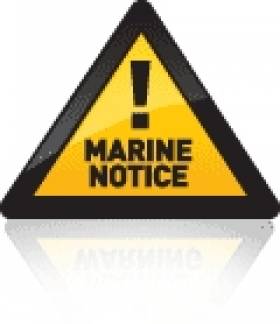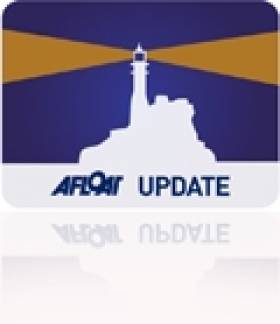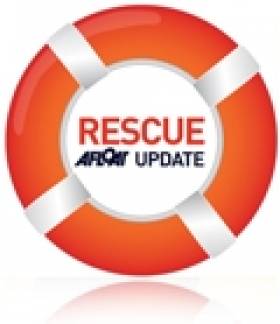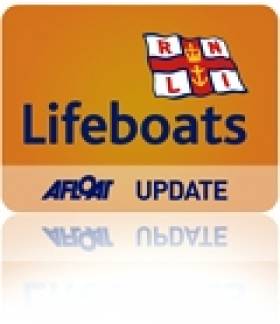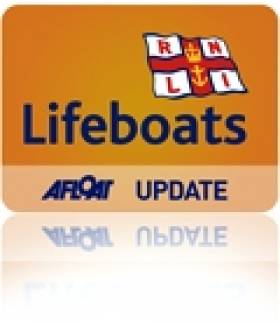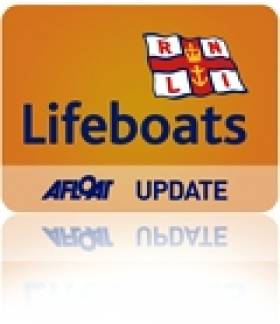Displaying items by tag: liferaft
#MarineNotice - Marine Notice No 8 of 2005 supplemented by Marine Notice No 16 of 2011 provided information on eight types of liferaft, which the Department of Transport, Tourism and Sport (DTTAS) accepts for use on small fishing vessels that are not required to carry a SOLAS/MED-approved liferaft.
The department now advises, in Marine Notice No 20 of 2015, that an additional liferaft has been deemed acceptable for use on such vessels. For clarity, the complete list – including the additional liferaft type now added – is shown below.
Accepted non-SOLAS/non-MED inflatable liferafts:
- DSB 4 - Person Inflatable Liferaft with “SOLAS B Pack”
- RFD Surviva 4 - Person Inflatable Liferaft with “SOLAS B Pack”
- RFD SEASAVA PRO ISO 9650 4 - Person Inflatable Liferaft with “SOLAS B Pack”
- Viking DK 4 - Person Inflatable Liferaft with “SOLAS B Pack”
- Zodiac 4 - Person Inflatable Liferaft with “SOLAS B Pack”
- EUROVINIL ISO/DIS 9650 4 - Person Inflatable Liferaft with “SOLAS B Pack”
- Sea-Safe 4 person inflatable liferaft :ISO 9650.1 group A Type 1 with “SOLAS B pack”
- Seago - ISO 9650-1 SOLAS B pack – 4 PERSON Liferaft
- Haining, Liferaft model HNF-YT IS09650-1 – with SOLAS B pack
Rectangular Liferaft Range Launched by Crewsaver
#LIFERAFT– Crewsaver launched its new range of high quality, innovative liferafts in the Watersports Action Pool at last week's Tullett Prebon London Boat Show 2012.
The Crewsaver ISO Ocean Liferaft range has been specifically designed, fully tested and certified to meet stringent ISO standard for inflatable liferafts.
Available in five sizes the Crewsaver ISO Ocean Liferaft can accommodate from four to twelve persons depending upon the model. When activated, the raft inflates quickly (see video below) to form a rectangular or hexagonal shape depending on the size.
As essential safety features, the entire raft is finished in a hi-vis orange colour and has an interior and exterior light to ensure optimum visibility. Other safety features
include large water ballast pockets and a semi rigid boarding ramp to aid people's access
Rambler 100 Crew Member 'Feels Lucky to be Alive'
An Australian crewmember on the stricken Rambler 100, which capsized in high winds during yesterday's Rolex Fastnet Race, has told reported that he feels "lucky to be alive".
Mike Motti was one of five crew who were separated from the yacht when it overturned near Fastnet Rock off the Cork coast.
He and his fellow crewmembers spent two hours adrift on a liferaft before they were rescued in foggy conditions which made the search all the more difficult.
“I’m feeling lucky to be alive, happy to be here and it’s great to see the local people here to greet us,” Motti told The Irish Times.
Fellow crewman Michael van Beuren said the yacht capsized within 30 seconds when its keel fin snapped in heavy seas.
All 21 crew were rescued from the yacht last night in an operation led by the Baltimore RNLI lifeboat and the Irish Coast Guard.
Five Escape When Yacht Hits Rocks Off Galway
Five sailors had a lucky escape when their yacht hit rocks off the coast of Galway in the early hours of Saturday morning, the Irish Examiner reports.
The crew of five, who had been taking part in the annual Around Aran Race, launched their liferaft when the boat ran aground and raise the alarm from the shore.
Galway's RNLI lifeboat was dispatched to the abandoned yacht in Galway Bay later that morning.
Crosshaven Lifeboat Rescues Crew from Sinking Fishing Vessel
At 11.19am , Valentia Coast Guard alerted Crosshaven RNLI Lifeboat that the fishing vessel was in serious trouble off the Church Bay area and requested an immediate launch. Crosshaven lifeboat launched within 5 minutes and with its volunteer crew of Kieran Coniry, Dan O'Donoghue and Vincent Fleming, made good progress through a two metre sea swell arriving on scene to find the fishing boat had at this stage sank and the crew safely in the Liferaft.
The Ballycotton RNLI all weather Lifeboat was at sea on exercise at the time and immediately altered course to the incident. Crosshaven Coast Guard were also tasked and en route.
When it became clear that the two crewmen were safely aboard the Crosshaven Lifeboat, the other emergency services were stood down. Crosshaven Lifeboat then brought the two fishermen back to Crosshaven.
While it is unknown what caused the fishing boat to flounder, the crew had little time to deploy their liferaft and make an emergency call before the boat sank.
Related Safety posts
RNLI Lifeboats in Ireland
Safety News
Rescue News from RNLI Lifeboats in Ireland
Coast Guard News from Ireland
Water Safety News from Ireland
Marine Casualty Investigation Board News
Marine Warnings
Lifeboat Assists Sinking Fishing Vessel in Cork Harbour
Yesterday while out on exercise in a squally southwesterly force four winds the crew of the Ballycotton lifeboat Austin Lidbury received details of a 26 foot fishing vessel that had sunk off Roches Point, at the mouth of Cork Harbour. The two crew members had taken to a liferaft and were retrieved by a fishing vessel in the area. Crosshaven lifeboat also launched and was first on scene. Ballycotton lifeboat was stood down and returned to station.
Related Safety posts
RNLI Lifeboats in Ireland
Safety News
Rescue News from RNLI Lifeboats in Ireland
Coast Guard News from Ireland
Water Safety News from Ireland
Marine Casualty Investigation Board News
Marine Warnings
Lifeboat Rescues Two Fishermen After Ten Hours Stranded in Liferaft
Two young fishermen are recovering today (Sunday 31 October 2010) after being rescued by lifeboat crew from Ballyglass RNLI. The two men were found in a liferaft 13 miles north of Belderrig in County Mayo after a lifeboat crewmember raised the alarm when they had not returned after to shore last night. Their fishing vessel had capsized and unable to raise the alarm the two men spent ten hours at sea in a liferaft waiting for help.
Ballyglass RNLI volunteer crewmember John Walsh contacted the Ballyglass Lifeboat Operations Manager when a fishing vessel had not returned to Porturlin when expected. Lifeboat Operations Manager Harry McCallum got in touch with Malin Head Coast Guard and the Ballyglass RNLI all weather lifeboat was launched at 11.49pm along with the Sligo based Coast Guard helicopter.
The rescue crews headed to the area where the fishermen were understood to be recovering pots from the water. The helicopter crew spotted the liferaft with the two men onboard and communicated the position to the lifeboat, which was nearby. The men had managed to remove their wet clothes and had put on plastic sacks to keep warm. They were recovered onto the lifeboat and taken to Ballyglass to recover.
Commenting on the callout Ballyglass RNLI Coxswain JT Gaughran said, " These two young men were extremely lucky. There had been nobody out searching for them until our crewmember John Walsh, who is an experienced fisherman, raised the alarm. Things can go wrong very quickly out at sea and every second counts. Thankfully conditions were moderate and once the search was underway they were spotted quickly."
The lifeboat pictured below returned to Ballyglass at 3am this morning with the two men onboard.
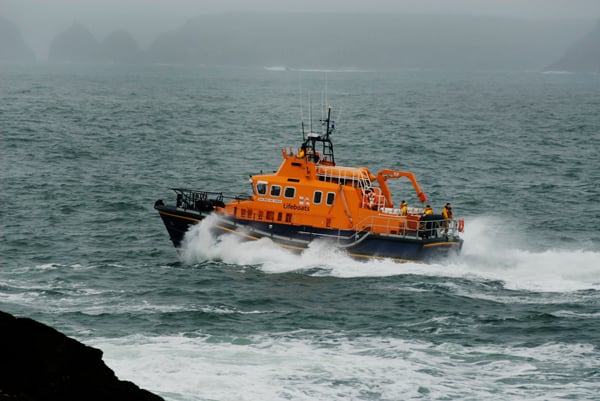
Related Safety posts
RNLI Lifeboats in Ireland
Safety News
Rescue News from RNLI Lifeboats in Ireland
Coast Guard News from Ireland
Water Safety News from Ireland
Marine Casualty Investigation Board News
Marine Warnings



























